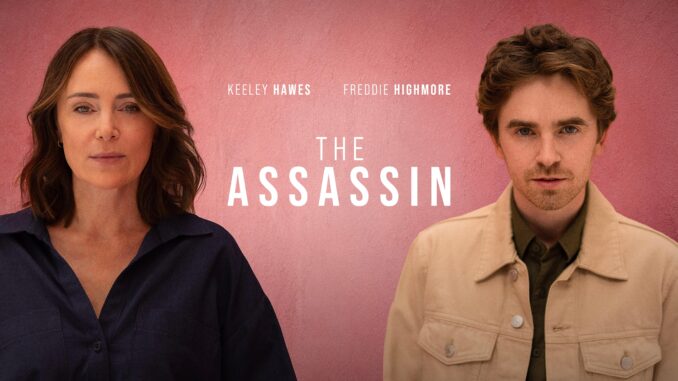
AMC+’s The Assassin arrives with an irresistible premise and a pair of leads who seem tailor-made for sparring banter: Keeley Hawes as a reluctant hitwoman and Freddie Highmore as the unlikely partner who complicates her carefully contained world. The result is a brisk, stylish comedy-thriller that charms more often than it dazzles, anchored by two charismatic performances that outshine the series’ occasional narrative shortcomings.
From its opening scenes, The Assassin makes it clear that it is not aiming for high-stakes crime drama. Instead, it leans into a tone that blends deadpan humor with quirky, noir-inflected pacing. Hawes plays her character with a sharp comedic edge—world-weary yet quick-witted, understated yet explosively funny when pushed. Highmore, meanwhile, slides into the role of her awkward foil with disarming ease, balancing neurotic energy with a surprising warmth that helps ground the series during its more chaotic swings.
Their chemistry is the show’s undeniable strength. Whether bickering over the logistics of an assignment gone sideways or reluctantly cooperating under pressure, the duo delivers a rhythm reminiscent of classic mismatched-partners comedies. Hawes’s dry delivery paired with Highmore’s earnest confusion creates a dynamic that feels both fresh and effortlessly entertaining. It’s the kind of on-screen pairing that could easily sustain a longer, more ambitious series.
Yet ambition is precisely where The Assassin occasionally stumbles. At just a handful of episodes with short runtimes, the series rarely digs deep into its characters’ histories or motivations. Promising threads—particularly those hinting at emotional trauma, moral conflict, or the ethics of contract killing—flare up briefly before being swept aside in favor of quick laughs or briskly choreographed action sequences. The tone is breezy, but sometimes at the expense of narrative substance.
The plot itself functions more as a loose framework than a fully developed engine. Each episode presents a new complication—botched assignments, eccentric clients, unexpected run-ins—but the stakes remain noticeably lightweight. This keeps the series fun and accessible, but it also limits how memorable the overarching story becomes. Moments that seem poised to deepen the characters’ relationship or escalate tension often resolve too neatly to leave a lasting mark.
Visually, the show compensates with flair. The cinematography embraces neon hues, shadowy corners, and sharply composed wide shots that give The Assassin a self-aware stylishness. The production design leans into the absurdity of the premise, with settings that oscillate between grounded realism and heightened comic exaggeration. Combined with a snappy score, the series maintains a light, rhythmic momentum even when the writing feels thin.
Ultimately, The Assassin succeeds as a showcase for Hawes and Highmore, who elevate the material with charm, timing, and committed performances. As a comedy-thriller, it may be too slight to satisfy viewers seeking edge or emotional heft. But as an entertaining, character-driven diversion, it hits its target with ease—even if it never quite delivers a killer blow.
